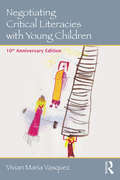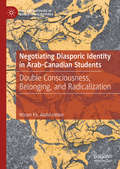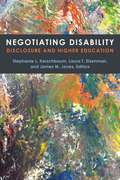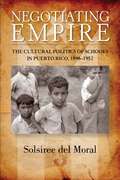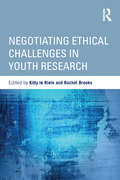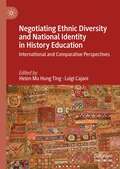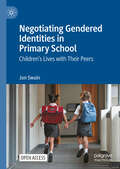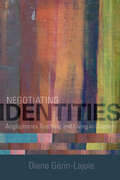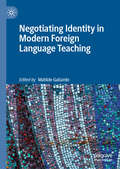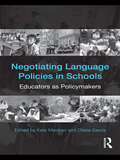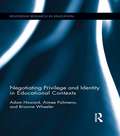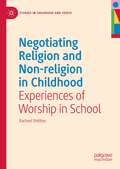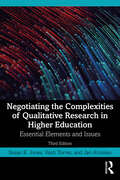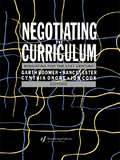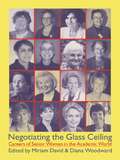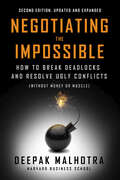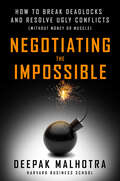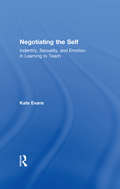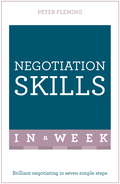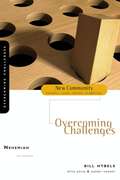- Table View
- List View
Negotiating Critical Literacies with Young Children: 10th Anniversary Edition (Language, Culture, and Teaching)
by Vivian Maria VasquezIn this innovative and engaging text, Vivian Maria Vasquez draws on her own classroom experience to demonstrate how issues raised from everyday conversations with pre-kindergarten children can be used to create an integrated critical literacy curriculum over the course of one school year. The strategies presented are solidly grounded in relevant theory and research. The author describes how she and her students negotiated a critical literacy curriculum; shows how they dealt with particular social and cultural issues and themes; and shares the insights she gained as she attempted to understand what it means to frame ones teaching from a critical literacy perspective. New in the 10th Anniversary Edition New section: "Getting Beyond Prescriptive Curricula, the Mandated Curriculum, and Core Standards" New feature: "Critical Reflections and Pedagogical Suggestions" at the end of the demonstration chaptesr New Appendices: "Resources for Negotiating Critical Literacies" and "Alternate Possibilities for Conducting an Audit Trail" Companion Website: narratives of ways in which the audit trail has been used as a tool for teaching and learning; resources on critical literacy including links to other websites and blogs; podcast focused on critical literacy and young children
Negotiating Diasporic Identity in Arab-Canadian Students: Double Consciousness, Belonging, and Radicalization (Palgrave Studies in Educational Futures)
by Wisam Kh. Abdul-JabbarThis book, framed through the notion of double consciousness, brings postcolonial constructs to sociopolitical and pedagogical studies of youth that have yet to find serious traction in education. Significantly, this book contributes to a growing interest among educational and curriculum scholars in engaging the pedagogical role of literature in the theorization of an inclusive curriculum. Therefore, this study not only recognizes the potential of immigrant literature in provoking critical conversation on changes young people undergo in diaspora, but also explores how the curriculum is informed by the diasporic condition itself as demonstrated by this negotiation of foreignness between the student and selected texts.
Negotiating Disability: Disclosure and Higher Education
by Stephanie L Kerschbaum Laura T Eisenman James M JonesDisability is not always central to claims about diversity and inclusion in higher education, but should be. This collection reveals the pervasiveness of disability issues and considerations within many higher education populations and settings, from classrooms to physical environments to policy impacts on students, faculty, administrators, and staff. While disclosing one’s disability and identifying shared experiences can engender moments of solidarity, the situation is always complicated by the intersecting factors of race and ethnicity, gender, sexuality, and class. With disability disclosure as a central point of departure, this collection of essays builds on scholarship that highlights the deeply rhetorical nature of disclosure and embodied movement, emphasizing disability disclosure as a complex calculus in which degrees of perceptibility are dependent on contexts, types of interactions that are unfolding, interlocutors’ long- and short-term goals, disabilities, and disability experiences, and many other contingencies.
Negotiating Empire
by Solsiree Del MoralAfter the United States invaded Puerto Rico in 1898, the new unincorporated territory sought to define its future. Seeking to shape the next generation and generate popular support for colonial rule, U. S. officials looked to education as a key venue for promoting the benefits of Americanization. At the same time, public schools became a site where Puerto Rican teachers, parents, and students could formulate and advance their own projects for building citizenship. In Negotiating Empire, Solsiree del Moral demonstrates how these colonial intermediaries aimed for regeneration and progress through education. Rather than seeing U. S. empire in Puerto Rico during this period as a contest between two sharply polarized groups, del Moral views their interaction as a process of negotiation. Although educators and families rejected some tenets of Americanization, such as English-language instruction, they also redefined and appropriated others to their benefit to increase literacy and skills required for better occupations and social mobility. Pushing their citizenship-building vision through the schools, Puerto Ricans negotiated a different school project-one that was reformist yet radical, progressive yet traditional, colonial yet nationalist.
Negotiating Ethical Challenges in Youth Research (Critical Youth Studies)
by Rachel Brooks Kitty Te RieleNegotiating Ethical Challenges in Youth Research brings together contributors from across the world to explore real-life ethical dilemmas faced by researchers working with young people in a range of social science disciplines. Unlike literature that tends to discuss youth research at an abstracted and exalted level, this volume aims to make the basic principles and guidelines of youth research more ‘real.’ By openly discussing actual challenges that researchers have experienced in the course of conducting their fieldwork or interpreting their findings, this collection provides the most authentic overview of the ethics of youth research available. A careful selection of chapters addresses a range of ethical challenges particularly relevant to contemporary youth researchers. Each chapter identifies an ethical issue that the author has personally experienced in his or her youth research, explains why this was a challenge or dilemma, outlines how the researcher responded to the challenge, and provides advice and draws out broader implications for youth researchers. The chapters are organized around three themes that capture core ethical challenges: power and agency, protection and harm prevention, and trust and respect. The result is a collection that is a rigorous and valuable resource to those embarking on research with young people for the first time as well as supporting the resolution of ethical challenges by more experienced researchers.
Negotiating Ethnic Diversity and National Identity in History Education: International and Comparative Perspectives
by Luigi Cajani Helen Mu Hung TingThis edited book explores the problems and challenges of negotiating the representation of ethnic minorities within history education. It investigates how states balance the (non-)acknowledgement of the reality of cultural or religious diversity, and the promotion of a point of convergence in history education to foster national identity. Shifting our attention away from the intractable challenges posed by post-conflict countries for reconciliation, the contributors draw attention to the need to explore ways to prevent or pre-empt conflicts and exclusion through history education, which could contribute to developing a more sustainable culture of peace. Drawing on a wide range of contexts and sources, this book asks how history education could contribute to forming critical, historically informed, and committed young citizens. The book will be of interest to students and academics working on themes such as nationalism, citizenship, ethnicity, history education, multicultural education, peace studies and area studies, as well as practitioners in the fields of history, social studies, civic or citizenship.
Negotiating Gendered Identities in Primary School: Children’s Lives with Their Peers
by Jon SwainThis open access book explores young children’s lives in their later years at primary school, from their own point of view. It focuses on how girls and boys experience life in their informal peer group and explores the dynamics of friendships and social hierarchies, identities and how time is spent outside of lessons, including the use of social media. The author interrogates how children make meanings: who they think they are, what it means to be a girl or a boy, and what forms of femininity and masculinity are most dominant. Findings are based on interviews conducted at a middle-class state school and a fee-paying preparatory school on the outskirts of London. The book will be of interest to students and scholars of primary education, schooling and gender, as well as primary school teachers both in the UK and internationally.
Negotiating Identities: Anglophones Teaching and Living in Quebec
by Diane Gerin-LajoieAs members of an official linguistic minority in Canada, Anglophone teachers living and working in Quebec have a distinct experience of the relationship between language and identity. In Negotiating Identities, Diane Gérin-Lajoie uses survey data and the life stories of Anglophone teachers to illustrate the social practices which connect them with their linguistic, cultural, and professional identities.Exploring the complexity of identity as a lived experience, Negotiating Identities demonstrates the strength of language as a political force in these educators' lives both in the classroom and outside it. Through comparisons with the other official linguistic minority in Canada, the Francophones, and particularly with Franco-Ontarians, this book tells the stories of Quebec's Anglophone teachers in their own words, providing a unique account of how these individuals make sense of their lives as residents of Quebec.
Negotiating Identity in Modern Foreign Language Teaching
by Matilde GallardoThis edited book examines modern foreign language teachers who research their own and others’ experiences of identity construction in the context of living and teaching in UK institutions, primarily in the Higher Education sector. The book offers an insight into a key element of the educational and socio-political debate surrounding MFL in the UK: the teachers’ voices and their sense of agency in constructing their professional identities. The contributors use a combination of empirical research and personal reflection to generate knowledge about MFL teachers’ identity that can enhance how they are perceived in the social and educational establishments and raise awareness of key issues affecting the profession. This book will be of particular interest to language teachers, teacher trainers, applied linguists and students and scholars of modern foreign languages.
Negotiating Language Policies in Schools: Educators as Policymakers
by Kate MenkenEducators are at the epicenter of language policy in education. This book explores how they interpret, negotiate, resist, and (re)create language policies in classrooms. Bridging the divide between policy and practice by analyzing their interconnectedness, it examines the negotiation of language education policies in schools around the world, focusing on educators’ central role in this complex and dynamic process. Each chapter shares findings from research conducted in specific school districts, schools, or classrooms around the world and then details how educators negotiate policy in these local contexts. Discussion questions are included in each chapter. A highlighted section provides practical suggestions and guiding principles for teachers who are negotiating language policies in their own schools.
Negotiating Privilege and Identity in Educational Contexts (Routledge Research in Education)
by Adam Howard Brianne Wheeler Aimee PolimenoRecent efforts emphasize the roles that privilege and elite education play in shaping affluent youths’ identities. Despite various backgrounds, the common qualities shared among the eight adolescents showcased in this book lead them to form particular understandings of self, others, and the world around them that serve as means for them to negotiate their privilege. These self-understandings are crucial for them to feel more at ease with being privileged, foster a positive sense of self, and reduce the negative feelings associated with their advantages – thus managing expectations for future success. Offering an intimate and comprehensive view of affluent adolescents’ inner lives and understandings, Negotiating Privilege and Identity in Educational Contexts explores these qualities and provides an important alternative perspective on privilege and how privilege works. The case studies in this volume explore different settings and lived experiences of eight privileged adolescents who, influenced by various sources, actively construct and cultivate their own privilege. Their stories address a wide range of issues relevant to the study of adolescence and the various social class factors that mediate adolescents’ educational experiences and identities.
Negotiating Religion and Non-religion in Childhood: Experiences of Worship in School (Studies in Childhood and Youth)
by Rachael ShillitoeThis book explores how and if the mandate for children to worship in schools can be justified within the context of declining church attendance and increasing nonreligious identification in British society. Shillitoe asks what place compulsory worship has in an increasingly diverse and plural society, and what the answer means for the relationship between religion, the secular, and education more broadly. Through in-depth ethnographic fieldwork from across three schools in southwest England, the book reveals how examining the significance of children’s experiences expands our understanding of both collective worship in schooling and religion in social life more broadly and demonstrates that adult-centric anxieties and assumptions in this area do not always reflect the experiences of children.
Negotiating the Complexities of Qualitative Research in Higher Education: Essential Elements and Issues
by Susan R. Jones Vasti Torres Jan ArminioNegotiating the Complexities of Qualitative Research in Higher Education illuminates the complex nature of qualitative research, while attending to issues of application. This text addresses the essentials of research through discussion of strategies, ethical issues, and challenges in higher education. In addition to walking through the methodological steps, this text considers the conceptual reasons behind qualitative research and explores how to conduct qualitative research that is rigorous, thoughtful, and theoretically coherent. Seasoned researchers Jones, Torres, and Arminio combine high-level theory with practical applications and examples, showing how research in higher education can produce improved learning outcomes for students, especially those who have been historically marginalized. This book will help students in higher education graduate programs to cultivate an appreciation for the complexity and ambiguity of the research and the ways to think through questions and tensions that emerge in the process. New in This Edition: Emphasis on participant representation and researcher reflexivity and positionality Additional conceptual frameworks that ground qualitative work in higher education and analyze power to reveal structural inequities A wider array of approaches including Participatory Action Research, Critical Discourse Analysis, and visual methodologies and methods A new chapter on writing that covers getting started, writing as analysis, writing to capture complexity, and positioning oneself in writing Updated citations and content throughout to reflect the newest thinking and scholarship New end-of-chapter discussion questions and activities to bolster accessibility of theory and help instructors support students' work on their course research projects.
Negotiating the Complexities of Qualitative Research in Higher Education: Fundamental Elements and Issues
by Susan R. Jones Vasti Torres Jan ArminioNegotiating the Complexities of Qualitative Research in Higher Education illuminates the complex nature of qualitative research, while attending to issues of application. This text addresses the fundamentals of research through discussion of strategies, ethical issues, and challenges in higher education. In addition to walking through the methodological steps, this text considers the conceptual reasons behind qualitative research and explores how to conduct qualitative research that is rigorous, thoughtful, and theoretically coherent. Seasoned researchers Jones, Torres, and Arminio combine high-level theory with practical applications and examples, showing how research in higher education can produce improved learning outcomes for students, especially those who have been historically marginalized. This book will help students in higher education and Student Affairs graduate programs to cultivate an appreciation for the complexity and ambiguity of the research and the ways to think thorough questions and tensions that emerge in the process. New in This Edition: Updated citations and content throughout to reflect the newest thinking and scholarship Expansion of current exemplars of qualitative research New exercises, activities, and examples throughout to bolster accessibility of theory A new chapter on Theoretical Perspectives with attention to new perspectives increasingly used in higher education and Student Affairs A new chapter on Challenges in Data Collection
Negotiating the Curriculum: Educating For The 21st Century
by Jonathan Cook Garth Boomer Cynthia Onore Nancy LesterThis work presents an ongoing international dialogue about the theory and Practice Of Curriculum Negotiating In The Classroom At Elementary, primary, secondary and university levels.
Negotiating the Glass Ceiling: Careers of Senior Women in the Academic World
by Miriam David Diana WoodwardWhy is it that in many universities the number of women professors can literally be counted on the fingers of one hand while the number of men number in the hundreds? Why are women academics so relatively disadvantaged and men so firmly in control?In an attempt to find answers to these questions Negotiating the Glass Ceiling gathers together the unique personal reflections of 16 eminent women working in higher education across the world. These personal reflections document some of the changing patterns of women's lives in higher education since the war, a time of massive social change within education itself, as well as in women's lives outside higher education. They also illustrate that the changes that have occured have been hard won and not without consequences for the women involved.
Negotiating the Impossible, Second Edition: How to Break Deadlocks and Resolve Ugly Conflicts (without Money or Muscle)
by Deepak MalhotraAward-winning professor from Harvard Business School offers a new and improved edition of his guide to navigating negotiation deadlock, while offering practical advice and stories of success.Updated with 20% new material, including a brand-new chapter and discussion guide.Harvard professor and negotiation adviser Deepak Malhotra shows how to defuse even the most potentially explosive situations and to find success when things seem impossible in this fully expanded upon second edition.Some negotiations are easy. Others are more difficult. And then there are situations that seem completely hopeless. Malhotra identifies three broad approaches for breaking deadlocks and resolving conflicts, and draws out scores of actionable lessons using behind-the-scenes stories of fascinating real-life negotiations, including:• drafting of the US Constitution• ending bitter disputes in the NFL and NHL• and beating the odds in complex business situations.He also shows how these same principles and tactics can be applied in everyday life, whether in a job interview or even negotiating with children. Brand new to this edition is a chapter on challenges facing today's world including how to effectively negotiate in virtual spaces, incorporate AI in your toolkit, and tackle increased polarization.With conflict escalating and no one willing to back down, Malhotra reminds us that negotiation is always, fundamentally, about human interaction. No matter how high the stakes the object of negotiation is to engage with other human beings in a way that leads to better understandings and agreements. The principles and strategies in this book will help you do this more effectively in every situation.
Negotiating the Impossible: How to Break Deadlocks and Resolve Ugly Conflicts (without Money or Muscle)
by Deepak Malhotra“Filled with great strategies you can immediately put to use in your business and personal lives . . . extremely entertaining, thought-provoking.” —Tyra Banks, CEO, TYRA Beauty, and creator of America’s Next Top ModelSome negotiations are easy. Others are more difficult. And then there are situations that seem completely hopeless. Conflict is escalating, people are getting aggressive, and no one is willing to back down. And to top it off, you have little power or other resources to work with. Harvard professor and negotiation adviser Deepak Malhotra shows how to defuse even the most potentially explosive situations and to find success when things seem impossible.Malhotra identifies three broad approaches for breaking deadlocks and resolving conflicts, and draws out scores of actionable lessons using behind-the-scenes stories of fascinating real-life negotiations, including drafting of the US Constitution, resolving the Cuban Missile Crisis, ending bitter disputes in the NFL and NHL, and beating the odds in complex business situations. But he also shows how these same principles and tactics can be applied in everyday life, whether you are making corporate deals, negotiating job offers, resolving business disputes, tackling obstacles in personal relationships, or even negotiating with children.As Malhotra reminds us, regardless of the context or which issues are on the table, negotiation is always, fundamentally, about human interaction. No matter how high the stakes or how protracted the dispute, the object of negotiation is to engage with other human beings in a way that leads to better understandings and agreements. The principles and strategies in this book will help you do this more effectively in every situation.“This book is magic for any deal maker.” —Daniel H. Pink, New York Times-bestselling author
Negotiating the Self: Identity, Sexuality, and Emotion in Learning to Teach
by Kate EvansFirst Published in 2002. Routledge is an imprint of Taylor & Francis, an informa company.
Negotiating: Bullet Guides
by Karen ManneringWhat's in this book? Open this book and you will... - Build rapport - Overcome obstacles - Stay in control - Close dealsLearn how to negotiate: - Knowing your basics - Negotiating and influencing - Negotiating for a win-win - Understanding strategy and tactics - Building rapport - Handling objections - Staying in control - Closing the dealSample page spread:What are Bullet Guides?The answers you need - now.Clear and concise guides in a portable format. Information is displayed in an easy-to-read layout with helpful images and tables. Bullet Guides include all you need to know about a subject in a nutshell. Get right to the point without wading through loads of unnecessary information.
Negotiating: Bullet Guides
by Karen ManneringWhat's in this book? Open this book and you will... - Build rapport - Overcome obstacles - Stay in control - Close dealsLearn how to negotiate: - Knowing your basics - Negotiating and influencing - Negotiating for a win-win - Understanding strategy and tactics - Building rapport - Handling objections - Staying in control - Closing the dealSample page spread:What are Bullet Guides?The answers you need - now.Clear and concise guides in a portable format. Information is displayed in an easy-to-read layout with helpful images and tables. Bullet Guides include all you need to know about a subject in a nutshell. Get right to the point without wading through loads of unnecessary information.
Negotiation Skills In A Week: Brilliant Negotiating In Seven Simple Steps
by Peter FlemingEffective negotiation skills just got easierThere was a time, not that long ago, when negotiation was seen, in the main, as the province of industrial relations folk and car-sales advisers. But, no longer! Repeated financial crises have squeezed profit margins and, in some markets, discouraged buyers from making marginal purchases or continuing habitual expenditure. Managers have found themselves in the frontline of the expectation to achieve better value for money, and the starting point for this is to shop around and explore the offers made by new suppliers, and/or to negotiate better deals with existing suppliers.Even if your job doesn't involve negotiation, then you might still be an active negotiator when replacing your car, moving house or even selling last season's wardrobe! The truth is that being a good negotiator has become a life skill, enabling those who are good at it not just to save money, but also to upgrade their computer, television or lawnmower with little or no increase in outgoings - and enhancing their reputation in the process.Becoming an effective negotiator is certainly within the scope of the majority of people. At its simplest, it involves thinking out what you want, planning how you'd like to get it and developing your powers of persuasion to convince other people that you are simply being reasonable.This book will help you to plan to become a better negotiator through being better prepared for meetings, planning clear and realistic objectives for a negotiation, maintaining concentration and making logical proposals that create agreement in the other party.- Sunday: Creating the right environment- Monday: Researching your objectives - Tuesday: People and places - Wednesday: Breaking the ice - Thursday: The agenda - Friday: Concluding- Saturday: Learning from your experiences
Negotiation Skills In A Week: Brilliant Negotiating In Seven Simple Steps (TYW)
by Peter FlemingEffective negotiation skills just got easierThere was a time, not that long ago, when negotiation was seen, in the main, as the province of industrial relations folk and car-sales advisers. But, no longer! Repeated financial crises have squeezed profit margins and, in some markets, discouraged buyers from making marginal purchases or continuing habitual expenditure. Managers have found themselves in the frontline of the expectation to achieve better value for money, and the starting point for this is to shop around and explore the offers made by new suppliers, and/or to negotiate better deals with existing suppliers.Even if your job doesn't involve negotiation, then you might still be an active negotiator when replacing your car, moving house or even selling last season's wardrobe! The truth is that being a good negotiator has become a life skill, enabling those who are good at it not just to save money, but also to upgrade their computer, television or lawnmower with little or no increase in outgoings - and enhancing their reputation in the process.Becoming an effective negotiator is certainly within the scope of the majority of people. At its simplest, it involves thinking out what you want, planning how you'd like to get it and developing your powers of persuasion to convince other people that you are simply being reasonable.This book will help you to plan to become a better negotiator through being better prepared for meetings, planning clear and realistic objectives for a negotiation, maintaining concentration and making logical proposals that create agreement in the other party.- Sunday: Creating the right environment- Monday: Researching your objectives - Tuesday: People and places - Wednesday: Breaking the ice - Thursday: The agenda - Friday: Concluding- Saturday: Learning from your experiences
Nehemiah (MacArthur Bible Studies)
by John MacarthurThese study guides, part of a 16-volume set from noted Bible scholar John MacArthur, take readers on a journey through biblical texts to discover what lies beneath the surface, focusing on meaning and context, and then reflecting on the explored passage or concept. With probing questions that guide the reader toward application, as well as ample space for journaling, The MacArthur Bible Studies are invaluable tools for Bible students of all ages.
Nehemiah: Overcoming Challenges
by Bill Hybels Kevin HarneyFace the Tough Times with Confidence The question is not, “Will I face challenges?” The issue is, “How will I deal with the tough times that come my way?” No one travels far down the road without confronting the sobering reality that life can be hard. The book of Nehemiah is a case study in overcoming life’s challenges. Wave after wave of pain pounded on the shores of Nehemiah’s life, but he kept standing strong. A tsunami of relational, financial, and spiritual attacks came, but he withstood it all in the power of God. As we meditate on Nehemiah’s story, we discover the hope and victory that come when we walk in God’s wisdom through the challenges of life.
